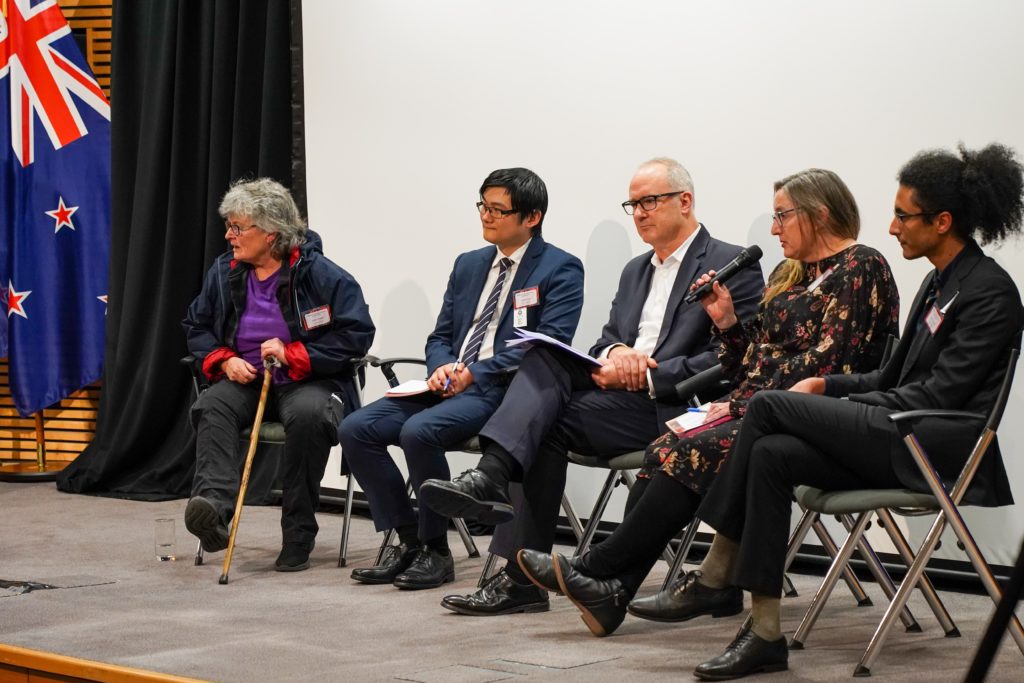
Eight New Zealanders have been appointed as members of the Public Advisory Committee for Disarmament and Arms Control (PACDAC) for the statutory body’s next 2022-2025 term. PACDAC chair Hon. Phil Twyford, Minister for Disarmament and Arms Control, announced the new roster of members on 22 December 2021. He said the line-up “reflects the significant talent we have in the New Zealand disarmament community” and “recognises that delivering on our disarmament goals means engagement across a wide range of society and disciplines.”
Established by statute through the 1987 New Zealand Nuclear Free Zone, Disarmament and Arms Control Act, PACDAC is mandated to provide independent, expert advice to government. It also distributes small grants to promote peace and disarmament educational projects and scholars, drawing from funds that France provided after it bombed the Greenpeace Rainbow Warrior ship in Auckland Harbour on 10 July 1985.
PACDAC members, 2022-2025
Hon. Phil Twyford, Minister for Disarmament and Arms Control
PACDAC chair Hon. Phil Twyford is New Zealand’s Minister for Disarmament and Arms Control. After studying politics at Auckland University, Phil worked as a journalist and union organiser before becoming the founding Executive Director of Oxfam New Zealand. Phil’s strong belief in justice led to him becoming Oxfam’s Global Advocacy Director, based in Washington DC. Upon returning to New Zealand, Phil was elected to Parliament for the Labour Party in 2008. Find the Minister on the Beehive website, Instagram and Twitter.
Mary Wareham
Deputy chair of PACDAC Mary Wareham is an advocate, researcher, and manager with experience in human rights and humanitarian disarmament. She is currently Advocacy Director for the Arms Division of Human Rights Watch. Mary served as founding global coordinator of the Stop Killer Robots campaign until March 2021. She campaigned for the adoption of the 1997 treaty banning landmines and the 2008 convention prohibiting cluster munitions and edits annual monitoring reports assessing compliance with these treaties. Mary received a Peace and Disarmament Education Trust scholarship in 1994 and served as a PACDAC member in 2007-2012. Find Mary on LinkedIn, Twitter, and Instagram.
Andrew Chen
Andrew Chen is a computer engineer working to address the ethical and societal impacts of emerging digital technologies. He is currently is a Venture Partner with the Matū Fund and Research Fellow at the University of Auckland’s Koi Tū – The Centre for Informed Futures. As a volunteer for the United Nations Youth Association of New Zealand (UNYNZ) in 2010-2014, Andrew organized Model UN conferences and an online Model UN writing competition for secondary school students across New Zealand. Find Andrew on LinkedIn and Twitter.
Kevin Clements
Kevin Clements is a preeminent academic in the field of peace and conflict studies, disarmament arms control, and human security. He is currently Director of the Toda Peace Institute in Tokyo, Japan. Kevin is also Emeritus Professor of Peace and Conflict Studies at the University of Otago in Dunedin, New Zealand, where he served as founding director of the National Centre for Peace and Conflict Studies established in 2009. Kevin writes extensively on the integrated nature of threats to human well-being and survival as well as the imperative of non violent politics, reconciliation and peacebuilding. Find Kevin on his Blog, LinkedIn and Twitter.
Martin Donoghue
Martin Donoghue is a former NZ Army engineer who has served with the New Zealand Defence Force in several capacities. He is currently Chief Executive Officer of the Royal New Zealand Returned and Services Association. Marty has carried out humanitarian mine clearance for the United Nations, humanitarian and private companies in Angola, Iraq, Laos and other countries contaminated by landmines, cluster munition remnants and other explosive remnants of war. He is a New Zealand Red Cross facilitator on the laws of war. Find Marty on LinkedIn.
Jamila Homayun
Jamila Homayun is a researcher, advocate, and manager with experience working in the humanitarian, disaster relief and refugee sectors. She is currently Head of International Projects at Habitat for Humanity New Zealand. Jamila has researched the impact of arms transfers for Human Rights Watch and Oxfam New Zealand. She participated in the diplomatic process to create the 2008 treaty prohibiting cluster munitions, highlighting the voices of survivors and affected communities in Afghanistan and other countries.
Edwina Hughes
Edwina Hughes is an activist and researcher with experience working to promote diplomacy and humanitarian disarmament for peace and security. She is currently the Coordinator of Peace Movement Aotearoa, which is the country’s national peace network and national lead for the International Campaign to Abolish Nuclear Weapons, Stop Killer Robots, and other global civil society coalitions. Edwina has engaged extensively human rights bodies and on women, peace and security.
Dylan Maynard
Dylan Maynard is a graduate student who interned with the New Zealand Red Cross in 2021. He is currently studying for a Masters of Strategic Studies at Victoria University of Wellington, where he graduated in 2020 with a Bachelor of Arts in international relations, public policy, and Mandarin Chinese. As the youngest PACDAC appointee, Dylan is eager to bring a youth perspective to the committee’s work as young people and future generations will be most affected by present-day inaction on emerging arms control challenges. Find Dylan on LinkedIn & Twitter.
Lucy Stewart
Lucy Stewart is an activist and manager with experience in disarmament education, events and media, and not-for-profit organizations. She is currently Programme Manager at the Disarmament and Security Centre in Christchurch, New Zealand. Lucy has worked for the New Zealand Centre for Global Studies and the Peace Foundation of New Zealand. She is a graduate of the University of Auckland and Victoria University of Wellington. Find Lucy on LinkedIn and Twitter.

Leave a Reply